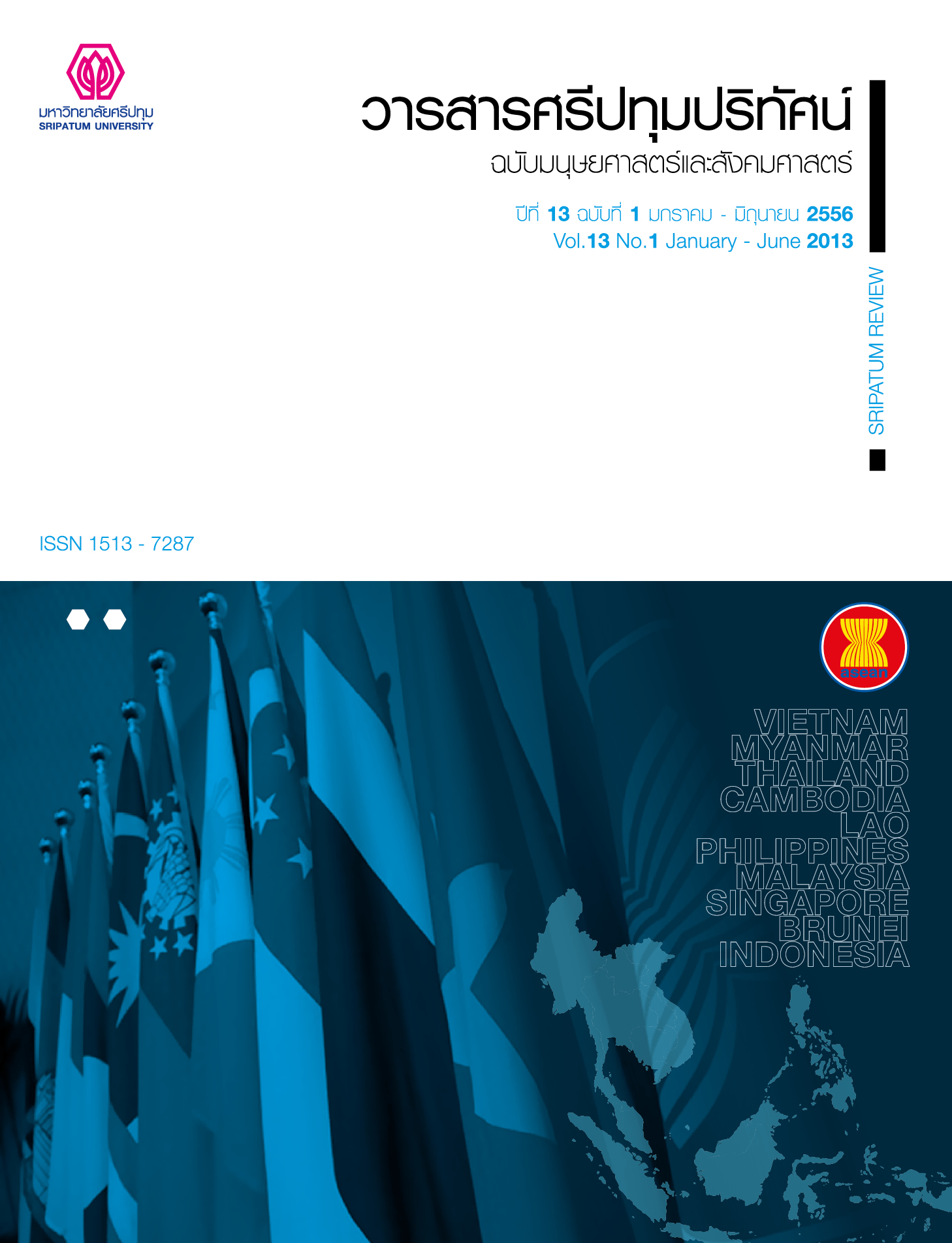OPERATING STATUS AND COMPETENCY OF EXECUTIVE COMMITTEES FOR THE MANAGEMENT OF SMALL AND MICRO COMMUNITY ENTERPRISES IN NAKHON PATHOM PROVINCE BASED ON THE PHILOSOPHY OF SUFFICIENCY ECONOMY
Main Article Content
Abstract
This article entitled “Operating status and competency level of executive
committees for the management of small and micro community enterprises in NakhonPathom Province based on the Philosophy of Sufficiency Economy”has 3 objectives; 1) to study the establishment goals and operating status of SMCEs; 2) to study executive committees’ competency level for the management of SMCEs; and 3) to compare opinionstowardthe operating status of SMCEs in NakhonPathom Province based on the philosophy of sufficiency economy, as classified by personal factors of respondents. This study employed both the quantitative and qualitative research methodologies. For the quantitative research methodology, a survey research was undertaken using a questionnaire as the data collecting instrument. For the qualitative research methodology, in-depth interviews were employed as the data collecting method. Quantitative data were analyzed with descriptive statistics, independent samples t-test, and one-way ANOVA; while qualitative data were analyzed with common themes analysis. The main research results are as follows:1)The sample rated the overall items for the establishment goals of SMCEs, operating status and management competency of SMCEs’executive committees at the high level ( = 3.57, =3.60 , =3.57). 2) The comparison of executive committees and members’ opinions on SMCEs’ operating status show that all demographic factors directly affectthe assessment opinions on the operating status of SMCEs at the 0.05 level of statistical significance.
To strengthen and sustain the management of SMCEs based on the philosophy of sufficiency economy in the long run, the research suggests that SMCEs’executive committees shouldbe continuously developed to equip them with both knowledge and ability to apply the philosophy of sufficiency economy by government agencies involved.
Article Details
1. กองบรรณาธิการสงวนสิทธิ์ในการพิจารณาและตัดสินการตีพิมพ์บทความในวารสาร
2. บทความทุกเรื่องจะได้รับการตรวจสอบทางวิชาการโดยผู้ทรงคุณวุฒิ แต่ข้อความและเนื้อหาในบทความที่ตีพิมพ์เป็นความรับผิดชอบของผู้เขียนแต่เพียงผู้เดียว มิใช่ความคิดเห็นและความรับผิดชอบของมหาวิทยาลัยศรีปทุม
3. การคัดลอกอ้างอิงต้องดำเนินการตามการปฏิบัติในหมู่นักวิชาการโดยทั่วไป และสอดคล้องกับกฎหมายที่เกี่ยวข้อง
References
เชื่อม ปัญญาสีห์. ประธานกลุ่มวิสาหกิจชุมชนออมทรัพย์สหกรณ์คลองโยง, สัมภาษณ์ 23 กรกฎาคม 2554.
นงคราญ กาญจนประเสริฐและคณะ. (2547). การบริหารจัดการแบบบูรณาการเพื่อพัฒนาอาชีพเชิงวิสาหกิจชุมชน: กรณีศึกษาองค์การบริหารส่วนตำบลมะตูม. ภายใต้ชุดโครงการวิจัยการบูรณาการการบริหารจัดการงานพัฒนาขององค์กรปกครองส่วนท้องถิ่นอย่างยั่งยืนเพื่อแก้ปัญหาความยากจน. มหาวิทยาลัยราชภัฏพิบูลสงคราม โดยทุนอุดหนุนการวิจัยจากสำนักงานคณะกรรมการการอุดมศึกษา.
นริศร์ มีเจริญ. (2547). การพัฒนากลุ่มอาชีพด้านเกษตรกรรมตามกระบวนการวิสาหกิจชุมชนอำเภอกาญจนดิษฐ์ จังหวัดสุราษฎร์ธานี. วิทยานิพนธ์ปริญญาศิลปศาสตรมหาบัณฑิต สาขายุทธศาสตร์การพัฒนา บัณฑิตวิทยาลัย สถาบันราชภัฏสุราษฎร์ธานี.
ประกฤติ เกิดมณี. ประธานกลุ่มวิสาหกิจชุมชนพัฒนายั่งยืน สัมภาษณ์ 17 กรกฎาคม 2554.
พิมพิมล แก้วมณี, นัทธมน ธีรสกุล อารี วิบูลย์พงศ์ และทรงศักดิ์ ศรีบุญจิตต์. (2549). เศรษฐกิจพอเพียง: หลักการกับความเข้าใจของวิสาหกิจชุมชนเกษตร. ในรายงานการประชุม
วิชาการ ศวก.
สุวกิจ ศรีปัดถา. (2549). ระดับความเป็นไปได้ในการประยุกต์หลักการจัดการธุรกิจตามแนวพระราชดำริเศรษฐกิจพอเพียงกับวิสาหกิจชุมชน. บทความวิจัยตีพิมพ์ในวารสารคณะ วิทยาการจัดการ มหาวิทยาลัยมหาสารคาม ปีที่ 2 ฉบับที่ 4 ภาคเรียนที่ 2/2549 หน้า 110-124.
ศิริมา เพ็งนรพัฒน์, เกษตรจังหวัดนครปฐม, สัมภาษณ์ ในการประชุม ภาคีนครปฐมจับมือยกระดับศักยภาพวิสาหกิจชุมชน สัมภาษณ์โดย อริย์ธัช พรอัศวโยธิน และ พรเพ็ญ
หลิมสัมพันธ์.


